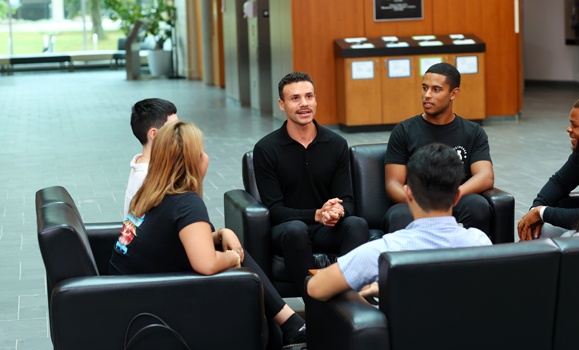Schools should be environments that foster social change and increase diversity in the business community, according to a panelist for an upcoming pilipili¬˛ª≠ event. And yet, ‚ÄúPost-secondary institutions are often not safe places for Indigenous students and peoples of colour,‚Äù says Mary Beth Doucette (BEng‚Äô04), an Assistant Professor and Purdy Crawford Chair in CBU‚Äôs Shannon School of Business.
Doucette is a panelist at on Wednesday, Nov. 24. The Faculty of Management is hosting this early morning online discussion which is open to all.
Dean Kim Brooks will moderate the conversation with Doucette and Alfred Burgesson as part of the Promise Scholars program. The Promise Scholars program was established by the Faculty of Management last year to recruit, retain, support and graduate more Black and Indigenous students. It offers scholarships, career supports and mentoring.
Earlier this year, the Dalhousie program expanded into the Atlantic Promise Scholars Initiative. A regional network of 13 business schools across Atlantic Canada now work together to increase opportunities for Black and Indigenous people in the classroom and the business community. This event involves three Promise Scholar partner schools: Dalhousie, Cape Breton University and Saint Mary’s University.
Creating safe spaces

Throughout her career, Doucette says she has experienced tokenism or the feeling of being an outsider at least once a week, basically, “anytime I’m in a professional group setting and I’m the only Indigenous identity person, or the only woman, or the only engineer, or the only Cape Bretoner,”
“Indigenous students that I’ve met with and worked with regularly recall moments of feeling unsafe or unwelcome in public schools and post-secondary institutions. This is true in every province of the country and every discipline,” Doucette says. She is a member of the Membertou First Nation and co-edited the book Indigenous Business in Canada: Principles and Practices. She researches interactions between the Mi’kmaq and Canadians by focusing on how people in organizations use policies and procedures to share knowledge in culturally informed ways.
“Mainstream professional circles are unfortunately not very diverse or integrative of diverse perspectives,” Doucette said.
The equity, diversity and inclusion goals of programs like Promise Scholars aim to address this. Post-secondary institutions can play a significant role in creating change, according to Doucette. She says, most importantly, schools should be places that encourage curiosity, develop critical thinking and bring people from different backgrounds together.
“I started doing research in the area of management history and the history of Canadian business education because mainstream business educators didn’t seem to appreciate how significant the barriers to entry in business and education were for Indigenous peoples,” she says.
“The bigger the school was, the less they seemed to care.”
Start with compassion
Universities and educators need to start with compassion when addressing these issues, says Doucette.
“Then we need integrative studies approaches, co-learning approaches, and collaborative planning processes that consistently bring people with diverse perspectives — professional, social, regional, gender — together to share their ideas,” she says.
Doucette says organizational models like this have existed in Cape Breton for the last 20 years and led to pilipili¬˛ª≠ful outcomes. But, she says, these models are still not discussed enough in business education.
According to the book Doucette co-edited, Indigenous students likely don‚Äôt hear about Indigenous pilipili¬˛ª≠es in the business sector. But, she says that doesn‚Äôt mean there aren‚Äôt any: ‚ÄúWhenever people, who are normally marginalized or othered, are in places where their opinions and perspectives are appreciated and valued, they do amazing things.‚Äù
Doucette will be joined by Alfred Burgesson on next week’s Promise Scholars panel.

Burgesson is the CEO of , a social enterprise that focuses on supporting Black, Indigenous and People of Colour pursuing Entrepreneurship & Innovation. He has experience advising local community groups, non-profit organizations, and government/crown corporations and he’s been an advisor to many leaders in Canada, including the Prime Minister, Senators, and First Nation Chiefs.
You can ¬ÝEmbracing Diversity: The Change We Need online discussion.

